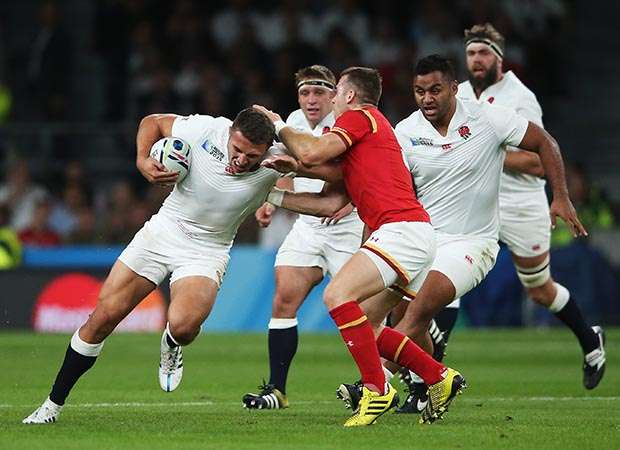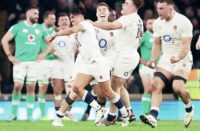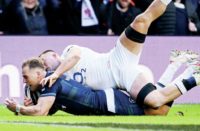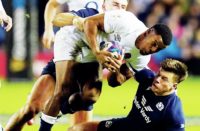 Decisions, decisions, when are they right and when are they wrong? That is a question that all of England has been asking this week and there has been a stream of accusations and opinions as to what went so wrong for England last Saturday against Wales.
Decisions, decisions, when are they right and when are they wrong? That is a question that all of England has been asking this week and there has been a stream of accusations and opinions as to what went so wrong for England last Saturday against Wales.
Was the decision to start Sam Burgess in his first real match in a new centre partnership a good idea, especially against a Welsh side that despite the injuries, had a more settled group of players? Was the decision right to substitute him for fly-half George Ford in the 69th minute? And then there was the big one: Chris Robshaw's, do we go for the try or the draw?
As with all decisions, there is never a right or wrong answer, sometimes they work, sometimes they don't. All decisions rely on one basic premise, that you hope you can deliver what you decide, only then is it the right decision. If you fail, as England did last week, everyone will question your ability to make the ‘right' choices at the right time. But get it right and all sins will be forgiven.
The decision of former England captain Will Carling to question how the team were prepared for this World Cup and the decision of some of the players and coaches to respond to what they saw as criticism, raises some interesting questions. Carling based his comments on hearsay, but hearsay that was attributed to the coaches themselves. If Carling's interpretation was right, that the coaches felt that the squad lacked leaders and therefore had to lead everything themselves in a ‘classroom style' manner, it would be highly unlikely that the players would have responded as they did.
For the players to risk sanctions from the management by responding to any story in the Press, given that they have specific instructions about how to deal with the media following the 2011 debacle, they must truly feel frustrated.
As none of us past players or coaches are involved at training or other squad meetings, all information is gleaned from what is in the public domain, or conversations with friends involved with the squad and the experience of having played in a similar environment.
The squad environment and game preparation, despite all protestation to the contrary, has not changed that much and the shared experience is used to make judgement calls. Just like trying to predict the result of a game based on how a team has played in the past, those judgements can sometimes be wrong.
What has to be remembered is that many ex-players and former coaches have been in the same position themselves and have had to deal with a level of media criticism. Carling took a lot of criticism after the 1990 Grand Slam game in Scotland for not choosing to kick the goals when a series of penalties were awarded at the scrum.
As I was playing, I was aware that he took advice from the pack leader, Brian Moore, who had told him the referee, David Bishop, had said he would give a penalty try if it happened again. He didn't and we lost the game. Carling also took a lot of stick when we lost the World Cup Final in ‘91 for the decision to play a very different style to how we had won the Grand Slam that year and reached the final.
In 1999, Lawrence Dallagio was criticised for not taking a kick at goal that would have put England eight points clear of Wales at Wembley before Scott Gibbs scored a try in the dying minutes of the game and Neil Jenkins converted the winning two points. After that loss, World Cup-winning coach Clive Woodward's 1999 comments, “Don't judge me on the Six Nations, judge me on the World Cup” could have cost him his job had the RFU listened to his critics after the quarter-final match when his England team were knocked out of the competition by five drop-goals from Jannie de Beer!
Lancaster was always going to suffer criticism if England lost the game against Wales because he had changed tack on the team's approach. In the games going into the World Cup, and indeed against Fiji, there seemed to be a desire to attack with players such as Ford, Jonathan Joseph, Anthony Watson, Jonny May and Mike Brown. But then there was a complete change of tactics; England threw away the playbook they had been using for the past three years and settled on the negative tactics of defence.
With the combination of Owen Farrell, Sam Burgess and Brad Barritt, it appears Lancaster and his coaches had decided that to win the World Cup they needed to follow the example of some of the teams that have won in the past. In other words, build a strong defence and have the best goal-kicker and rely on your defence to get you penalties.
The decision to pick Burgess was a risk, particularly when paired with Barritt as they had not played together before. He did what was asked, but maybe not as well as he could have with more game time. The problem with Burgess is all the hype that's been surrounding him. He did nothing terrible against Wales, but nor was he exceptional, but because of the fanfare around him there was an expectation that he would single-handedly win the game. The expectation was tempered with the slight worry he might put a foot wrong – but the constant reassurances from the management team as to Burgess's influence on the squad further increased the hype.
It may be that some of Lancaster's decisions during this World Cup will be proven wrong, just as his critics were wrong during their time – but if given the chance like Woodward, Lancaster's decision may be proved right for 2019.


























